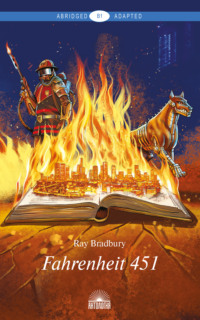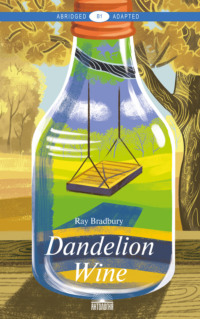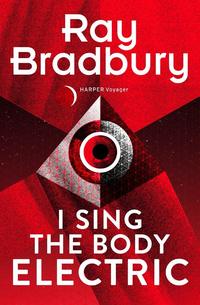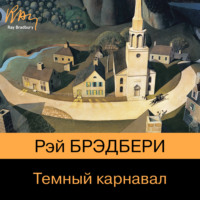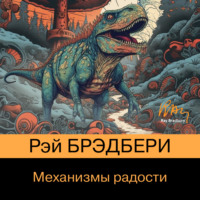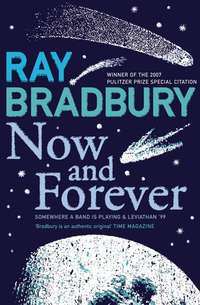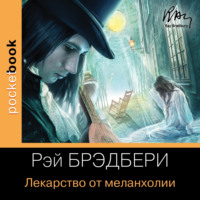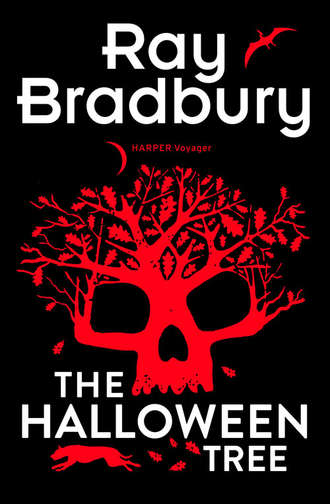
Полная версия
The Halloween Tree

THE HALLOWEEN TREE
Illustrated by Joseph Mugnaini
Ray Bradbury


With love for
MADAME MAN’HA GARREAU-DOMBASLE
met twenty-seven years
ago in the graveyard at
midnight on the Island
of Janitzio at Lake Patzcuaro,
Mexico, and remembered
on each anniversary of
The Day of the Dead.
Table of Contents
Cover
Title Page
Dedication
Chapter 1
Chapter 2
Chapter 3
Chapter 4
Chapter 5
Chapter 6
Chapter 7
Chapter 8
Chapter 9
Chapter 10
Chapter 11
Chapter 12
Chapter 13
Chapter 14
Chapter 15
Chapter 16
Chapter 17
Chapter 18
Chapter 19
Keep Reading
About the Book
About the Author and Illustrator
Also by the Author
Copyright
About the Publisher
Chapter 1

It was a small town by a small river and a small lake in a small northern part of a Midwest state. There wasn’t so much wilderness around you couldn’t see the town. But on the other hand there wasn’t so much town you couldn’t see and feel and touch and smell the wilderness. The town was full of trees. And dry grass and dead flowers now that autumn was here. And full of fences to walk on and sidewalks to skate on and a large ravine to tumble in and yell across. And the town was full of …
Boys.
And it was the afternoon of Halloween.
And all the houses shut against a cool wind.
And the town full of cold sunlight.
But suddenly, the day was gone.
Night came out from under each tree and spread.
Behind the doors of all the houses there was a scurry of mouse feet, muted cries, flickerings of light.
Behind one door, Tom Skelton, aged thirteen, stopped and listened.
The wind outside nested in each tree, prowled the sidewalks in invisible treads like unseen cats.
Tom Skelton shivered. Anyone could see that the wind was a special wind this night, and the darkness took on a special feel because it was All Hallows’ Eve. Everything seemed cut from soft black velvet or gold or orange velvet. Smoke panted up out of a thousand chimneys like the plumes of funeral parades. From kitchen windows drifted two pumpkin smells: gourds being cut, pies being baked.
The cries behind the locked house doors grew more exasperated as shadows of boys flew by windows. Half-dressed boys, greasepaint on their cheeks; here a hunchback, there a medium-size giant. Attics were still being rummaged, old locks broken, old steamer chests disemboweled for costumes.
Tom Skelton put on his bones.
He grinned at the spinal cord, the ribcage, the kneecaps stitched white on black cotton.
Lucky! he thought. What a name you got! Tom Skelton. Great for Halloween! Everyone calls you Skeleton! So what do you wear?
Bones.
Wham. Eight front doors banged shut.
Eight boys made a series of beautiful leaps over flowerpots, rails, dead ferns, bushes, landing on their own dry-starched front lawns. Galloping, rushing, they seized a final sheet, adjusted a last mask, tugged at strange mushroom caps or wigs, shouting at the way the wind took them along, helped their running; glad of the wind, or cursing boy curses as masks fell off or hung sidewise or stuffed up their noses with a muslin smell like a dog’s hot breath. Or just letting the sheer exhilaration of being alive and out on this night pull their lungs and shape their throats into a yell and a yell and a … yeeeellll!
Eight boys collided at one intersection.
“Here I am: Witch!”
“Apeman!”
“Skeleton!” said Tom, hilarious inside his bones.
“Gargoyle!”
“Beggar!”
“Mr. Death Himself!”
Bang! They shook back from their concussions, all happy-fouled and tangled under a street-corner light. The swaying electric lamp belled in the wind like a cathedral bell. The bricks of the street became planks of a drunken ship all tilted and foundered with dark and light.
Behind each mask was a boy.
“Who’s that?” Tom Skelton pointed.
“Won’t tell. Secret!” cried the Witch, disguising his voice.
Everyone laughed.
“Who’s that?”
“Mummy!” cried the boy inside the ancient yellowed wrappings, like an immense cigar stalking the night streets.
“And who’s—?”
“No time!” said Someone Hidden Behind Yet Another Mystery of Muslin and Paint. “Trick or treat!”
“Yeah!”
Shrieking, wailing, full of banshee mirth they ran, on everything except sidewalks, going up into the air over bushes and down almost upon yipping dogs.
But in the middle of running, laughing, barking, suddenly, as if a great hand of night and wind and smelling-something-wrong stopped them, they stopped.
“Six, seven, eight.”
“That can’t be! Count again.”
“Four, five, six—”
“Should be nine of us! Someone’s missing!”
They sniffed each other, like fearful beasts.
“Pipkin’s not here!”
How did they know? They were all hidden behind masks. And yet, and yet …
They could feel his absence.
“Pipkin! He’s never missed a Halloween in a zillion years. Boy, this is awful. Come on!”
In one vast swerve, one doglike trot and ramble, they circled round and down the middle of the cobble-brick street, blown like leaves before a storm.
“Here’s his place!”
They pulled to a halt. There was Pipkin’s house, but not enough pumpkins in the windows, not enough cornshocks on the porch, not enough spooks peering out through the dark glass in the high upstairs tower room.
“Gosh,” said someone, “what if Pipkin’s sick?”
“It wouldn’t be Halloween without Pipkin.”
“Not Halloween,” they moaned.
And someone threw a crabapple at Pipkin’s front door. It made a small thump, like a rabbit kicking the wood.
They waited, sad for no reason, lost for no reason. They thought of Pipkin and a Halloween that might be a rotten pumpkin with a dead candle if, if, if—Pipkin wasn’t there.
Come on, Pipkin. Come out and save the Night!
Chapter 2

Why were they waiting, afraid for one small boy?
Because…
Joe Pipkin was the greatest boy who ever lived. The grandest boy who ever fell out of a tree and laughed at the joke. The finest boy who ever raced around the track, winning, and then, seeing his friends a mile back somewhere, stumbled and fell, waited for them to catch up, and joined, breast and breast, breaking the winner’s tape. The jolliest boy who ever hunted out all the haunted houses in town, which are hard to find, and came back to report on them and take all the kids to ramble through the basements and scramble up the ivy outside-bricks and shout down the chimneys and make water off the roofs, hooting and chimpanzee-dancing and ape-bellowing. The day Joe Pipkin was born all the Orange Crush and Nehi soda bottles in the world fizzed over; and joyful bees swarmed countrysides to sting maiden ladies. On his birthdays, the lake pulled out from the shore in midsummer and ran back with a tidal wave of boys, a big leap of bodies and a downcrash of laughs.
Dawns, lying in bed, you heard a birdpeck at the window. Pipkin.
You stuck your head out into the snow-water-clear-summer-morning air.
There in the dew on the lawn rabbit prints showed where, just a moment ago, not a dozen rabbits but one rabbit had circled and crisscrossed in a glory of life and exultation, bounding hedges, clipping ferns, tromping clover. It resembled the switchyards down at the rail depot. A million tracks in the grass but no …
Pipkin.
And here he rose up like a wild sunflower in the garden. His great round face burned with fresh sun. His eyes flashed Morse code signals:
“Hurry up! It’s almost over!”
“What?”
“Today! Now! Six A.M.! Dive down! Wade in it!”
Or: “This summer! Before you know, bang!—it’s gone! Quick!”
And he sank away in sunflowers to come up all onions.
Pipkin, oh, dear Pipkin, finest and loveliest of boys.
How he ran so fast no one knew. His tennis shoes were ancient. They were colored green of forests jogged through, brown from old harvest trudges through September a year back, tar-stained from sprints along the docks and beaches where the coal barges came in, yellow from careless dogs, splinter-filled from climbing wood fences. His clothes were scarecrow clothes, worn by Pipkin’s dogs all night, loaned to them for strolls through town, with chew marks along the cuffs and fall marks on the seat.
His hair? His hair was a great hedgehog bristle of bright brown-blond daggers sticking in all directions. His ears, pure peachfuzz. His hands, mittened with dust and the good smell of airedales and peppermint and stolen peaches from the far country orchards.
Pipkin. An assemblage of speeds, smells, textures; a cross section of all the boys who ever ran, fell, got up, and ran again.
No one, in all the years, had ever seen him sitting still. He was hard to remember in school, in one seat, for one hour. He was the last into the schoolhouse and the first exploded out when the bell ended the day.
Pipkin, sweet Pipkin.
Who yodeled and played the kazoo and hated girls more than all the other boys in the gang combined.
Pipkin, whose arm around your shoulder, and secret whisper of great doings this day, protected you from the world.
Pipkin.
God got up early just to see Pipkin come out of his house, like one of those people on a weatherclock. And the weather was always fine where Pipkin was.
Pipkin.
They stood in front of his house.
Any moment now that door would open wide.
Pipkin would jump out in a blast of fire and smoke.
And Halloween would REALLY begin!
Come on, Joe, oh, Pipkin, they whispered, come on!
Chapter 3

The front door opened.
Pipkin stepped out.
Not flew. Not banged. Not exploded.
Stepped out.
And came down the walk to meet his friends.
Not running. And not wearing a mask! No mask!
But moving along like an old man, almost.
“Pipkin!” they shouted, to scare away their uneasiness.
“Hi, gang,” said Pipkin.
His face was pale. He tried to smile, but his eyes looked funny. He was holding his right side with one hand as if he had a boil there.
They all looked at his hand. He took his hand away from his side.
“Well,” he said with faint enthusiasm. “We ready to go?”
“Yeah, but you don’t look ready,” said Tom. “You sick?”
“On Halloween?” said Pipkin. “You kidding?”
“Where’s your costume—?”
“You go on ahead, I’ll catch up.”
“No, Pipkin, we’ll wait for you to—”
“Go on,” said Pipkin, saying it slowly, his face deathly pale now. His hand was back on his side.
“You got a stomachache?” asked Tom. “You told your folks?”
“No, no, I can’t! They’d—” Tears burst from Pipkin’s eyes. “It’s nothing, I tell you. Look. Go straight on toward the ravine. Head for the House, okay? The place of the Haunts, yeah? Meet you there.”
“You swear?”
“Swear. Wait’ll you see my costume!”
The boys began to back off. On the way, they touched his elbow, or knocked him gently in the chest, or ran their knuckles along his chin in a fake fight. “Okay, Pipkin. As long as you’re sure—”
“I’m sure.” He took his hand away from his side. His face colored for a moment as if the pain were gone. “On your marks. Get set. Go!”
When Joe Pipkin said “Go,” they Went.
They ran.
They ran backward halfway down the block, so they could see Pipkin standing there, waving at them.
“Hurry up, Pipkin!”
“I’ll catch you!” he shouted, a long way off.
The night swallowed him.
They ran. When they looked back again, he was gone.
They banged doors, they shouted Trick or Treat and their brown paper bags began to fill with incredible sweets. They galloped with their teeth glued shut with pink gum. They ran with red wax lips bedazzling their faces.
But all the people who met them at doors looked like candy factory duplicates of their own mothers and fathers. It was like never leaving home. Too much kindness flashed from every window and every portal. What they wanted was to hear dragons belch in basements and banged castle doors.
And so, still looking back for Pipkin, they reached the edge of town and the place where civilization fell away in darkness.
The Ravine.
The ravine, filled with varieties of night sounds, lurkings of black-ink stream and creek, lingerings of autumns that rolled over in fire and bronze and died a thousand years ago. From this deep place sprang mushroom and toadstool and cold stone frog and crawdad and spider. There was a long tunnel down there under the earth in which poisoned waters dripped and the echoes never ceased calling Come Come Come and if you do you’ll stay forever, forever, drip, forever, rustle, run, rush, whisper, and never go, never go go go …
The boys lined up on the rim of darkness, looking down.
And then Tom Skelton, cold in his bones, whistled his breath in his teeth like the wind blowing over the bedroom screen at night. He pointed.
“Oh, hey—that’s where Pipkin told us to go!”
He vanished.
All looked. They saw his small shape race down the dirt path into one hundred million tons of night all crammed in that huge dark pit, that dank cellar, that deliciously frightening ravine.
Yelling, they plunged after.
Where they had been was empty.
The town was left behind to suffer itself with sweetness.
Chapter 4

They ran down through the ravine at a swift rush, all laughing, jostling, all elbows and ankles, all steamy snort and roustabout, to stop in collision when Tom Skelton stopped and pointed up the path.
“There,” he whispered. “There’s the only house in town worth visiting on Halloween! There!”
“Yeah!” said everyone.
For it was true. The house was special and fine and tall and dark. There must have been a thousand windows in its sides, all shimmering with cold stars. It looked as if it had been cut out of black marble instead of built out of timbers, and inside? who could guess how many rooms, halls, breezeways, attics. Superior and inferior attics, some higher than others, some more filled with dust and webs and ancient leaves or gold buried above ground in the sky but lost away so high no ladder in town could take you there.
The house beckoned with its towers, invited with its gummed-shut doors. Pirate ships are a tonic. Ancient forts are a boon. But a house, a haunted house, on All Hallows’ Eve? Eight small hearts beat up an absolute storm of glory and approbation.
“Come on.”
But they were already crowding up the path. Until they stood at last by a crumbling wall, looking up and up and still farther up at the great tombyard top of the old house. For that’s what it seemed. The high mountain peak of the mansion was littered with what looked like black bones or iron rods, and enough chimneys to choke out smoke signals from three dozen fires on sooty hearths hidden far below in the dim bowels of this monster place. With so many chimneys, the roof seemed a vast cemetery, each chimney signifying the burial place of some old god of fire or enchantress of steam, smoke, and firefly spark. Even as they watched, a kind of bleak exhalation of soot breathed up out of some four dozen flues, darkening the sky still more, and putting out some few stars.
“Boy,” said Tom Skelton, “Pipkin sure knows what he’s talking about!”
“Boy,” said all, agreeing.
They crept along a weed-infested path toward the crumpled front porch.
Tom Skelton, alone, itched his bony foot up on the first porch-step. The others gasped at his bravery. So, now, finally in a mob, a compact mass of sweating boys moved up on the porch amid fierce cries of the planks underfoot, and shudderings of their bodies. Each wished to pull back, swivel about, run, but found himself trapped against the boy behind or in front or to the side. So, with a pseudopod thrust out here or there, the amoebic form, the large perspiration of boys leaned and made a run and a stop to the front door of the house which was as tall as a coffin and twice as thin.
They stood there for a long moment, various hands reaching out like the legs of an immense spider as if to twist that cold knob or reach up for the knocker on that front door. Meanwhile, the wooden floorings of the porch sank and wallowed beneath their weight, threatening at every shift of proportion to give way and fling them into some cockroach abyss beneath. The planks, each tuned to an A or an F or a C, sang out their uncanny music as heavy shoes scraped on them. And if there had been time and it were noon, they might have danced out a cadaver’s tune or a skeleton’s rigadoon, for who can resist an ancient porch which, like a gigantic xylophone, only wants to be jumped on to make music?
But they were not thinking this.
Henry-Hank Smith (for that’s who it was), hidden inside his black Witch’s costume, cried: “Look!”
And all looked at the knocker on the door. Tom’s hand trembled out to touch it.
“A Marley knocker!”
“What?”
“You know, Scrooge and Marley, a Christmas Carol!” whispered Tom.
And indeed the face that made up the knocker on the door was the face of a man with a dread toothache, his jaw bandaged, his hair askew, his teeth prolapsed, his eyes wild. Dead-as-a-doornail Marley, friend to Scrooge, inhabitor of lands beyond the grave, doomed to wander this earth forever until …
“Knock,” said Henry-Hank.
Tom Skelton took hold of old Marley’s cold and grisly jaw, lifted it, and let it fall.
All jumped at the concussion!
The entire house shook. Its bones ground together. Shades snap-furled up so that windows blinked wide their ghastly eyes.
Tom Skelton cat-leaped to the porch rail, staring up.
On the rooftop, weird weathercocks spun. Two-headed roosters whirled in the sneezed wind. A gargoyle on the western rim of the house erupted twin snorts of rain-funnel dust. And down the long snaking serpentine rainspouts of the house, after the sneeze had died and the weathercocks ceased spinning, vagrant wisps of autumn leaf and cobweb fell gusting out onto the dark grass.
Tom whirled to look at the faintly shuddering windows. Moonlit reflections trembled in the glass like schools of disturbed silver minnows. Then the front door gave a shake, a twist of its knob, a grimace of its Marley knocker, and flung itself wide.
The wind made by the suddenly opening door almost knocked the boys off the porch. They seized one another’s elbows, yelling.
Then the darkness within the house inhaled. A wind sucked through the gaping door. It pulled at the boys, dragging them across the porch. They had to lean back so as not to be snatched into the deep dark hall. They struggled, shouted, clutched the porch rails. But then the wind ceased.
Darkness moved within darkness.
Inside the house, a long way off, someone was walking toward the door. Whoever it was must have been dressed all in black for they could see nothing but a pale white face drifting on the air.
An evil smile came and hung in the doorway before them.
Behind the smile, the tall man hid in shadow. They could see his eyes now, small pinpoints of green fire in little charred pits of sockets, looking out at them.
“Well,” said Tom. “Er—trick or treat?”
“Trick?” said the smile in the dark. “Treat?”
“Yes, sir.”
The wind played a flute in a chimney somewhere; an old song about time and dark and far places. The tall man shut up his smile like a bright pocketknife.
“No treats,” he said. “Only—trick!”
The door slammed!
The house thundered with showers of dust.
Dust puffed out the rainspout again, in fluffs, like an emergence of downy cats.
Dust gasped from open windows. Dust snorted from the porchboards under their feet.
The boys stared at the locked shut-fast front door. The Marley knocker was not scowling now, but smiling an evil smile.
“What’s he mean?” asked Tom. “No treats, only trick?”
Backing off around the side of the house they were astonished at the sounds it made. A whole rigamarole of whispers, squeaks, creaks, wails, and murmurs, and the night wind was careful to let the boys hear them all. With every step they took, the great house leaned after them with soft groans.

They rounded the far side of the house and stopped.
For there was the Tree.
And it was such a tree as they had never seen in all their lives.
It stood in the middle of a vast yard behind the terribly strange house. And this tree rose up some one hundred feet in the air, taller than the high roofs and full and round and well branched, and covered all over with rich assortments of red and brown and yellow autumn leaves.
“But,” whispered Tom, “oh, look. What’s up in that tree!”
For the Tree was hung with a variety of pumpkins of every shape and size and a number of tints and hues of smoky yellow or bright orange.
“A pumpkin tree,” someone said.
“No,” said Tom.
The wind blew among the high branches and tossed their bright burdens, softly.
“A Halloween Tree,” said Tom.
And he was right.
Chapter 5

The pumpkins on the Tree were not mere pumpkins. Each had a face sliced in it. Each face was different. Every eye was a stranger eye. Every nose was a weirder nose. Every mouth smiled hideously in some new way.
There must have been a thousand pumpkins on this tree, hung high and on every branch. A thousand smiles. A thousand grimaces. And twice-times-a-thousand glares and winks and blinks and leerings of fresh-cut eyes.



